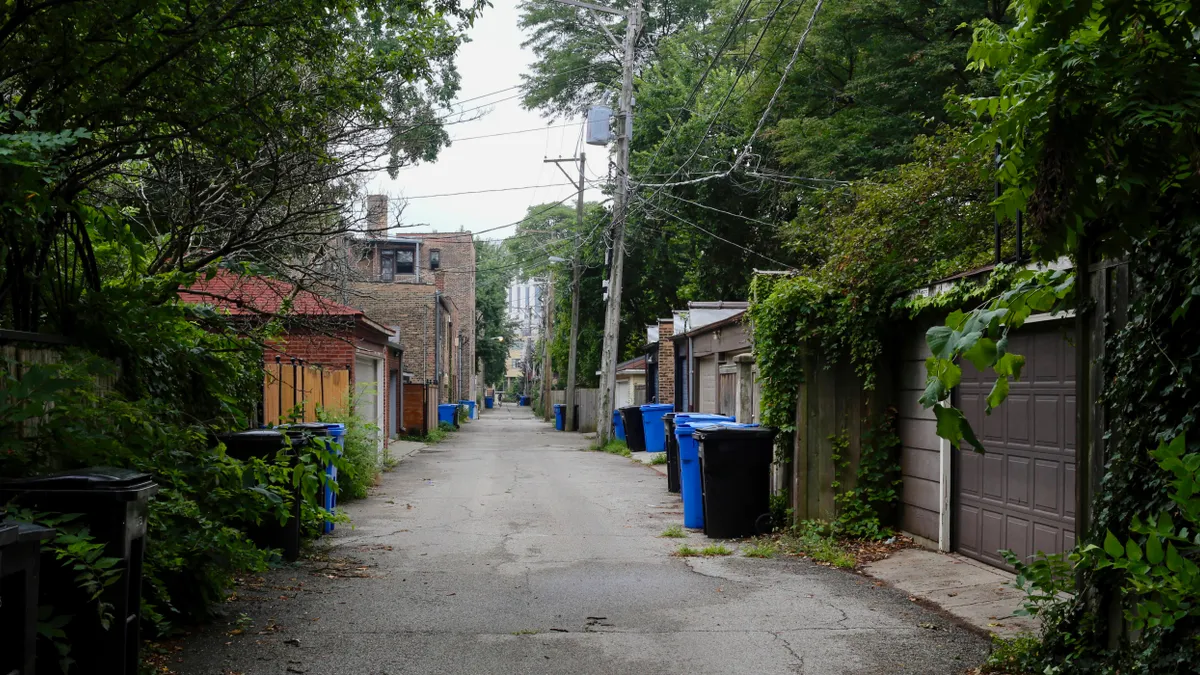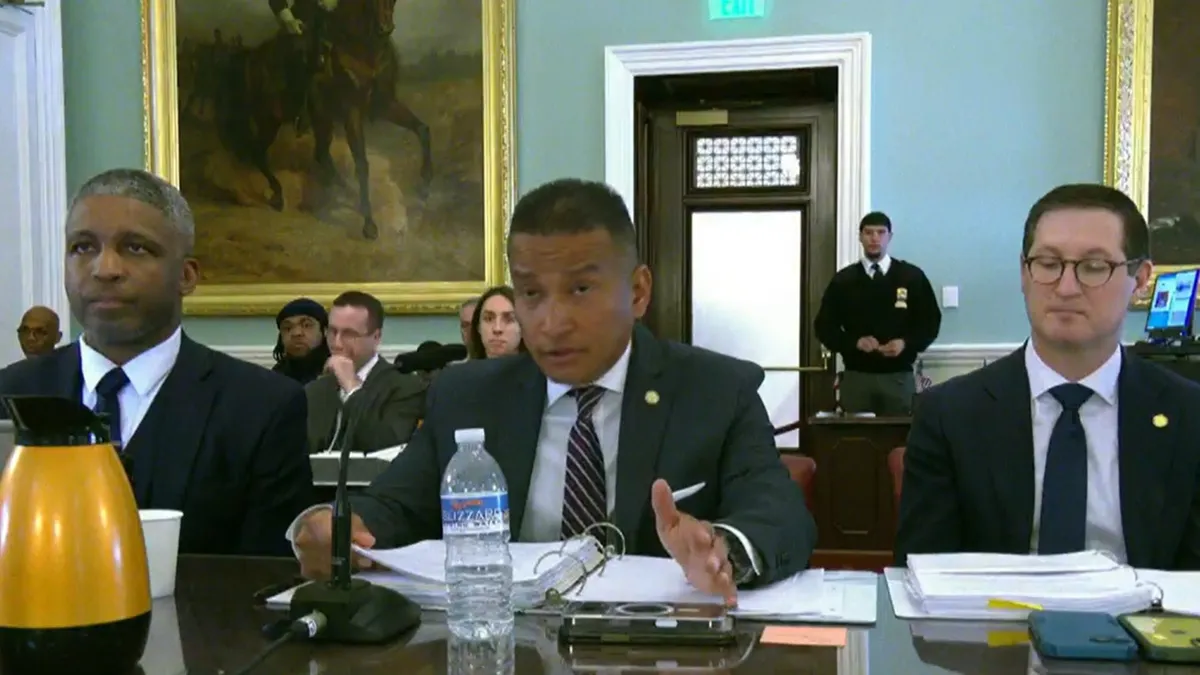UPDATE: April 5, 2021: Chicago's Department of Streets and Sanitation announced it will award a three-year residential recycling collection and processing contract for four of six zones to LRS. City crews will continue collection service in their current two zones. The contract, worth $79.6 million according to the Chicago Sun Times, takes effect in June and will include new penalties for missed collections as well as an agreement to collect carts with contamination rates of up to 50%. Longer-term decisions about city waste policy, including commercial and high-density residential recycling, will be informed by a forthcoming Delta Institute report.
January 20: Chicago is poised to award one or more new contracts for the biweekly collection and processing of recyclables in its residential Blue Cart program for the first time in many years, with the potential for notable changes depending on the outcome.
The city's Blue Cart program covers more than 620,000 households in buildings with up to four units, plus certain municipal facilities, and is among Chicago's most visible recycling efforts. The program collected nearly 73,000 tons of material in 2019 and more than 65,000 tons through September 2020, with recent volumes above average due to the pandemic. The city's Department of Streets and Sanitation (DSS), which handles collection in two of six zones, solicited bids for the whole city in a sign that full privatization could be possible.
Following two rounds of bids on an identical request for proposals (RFP), because bids were either non-responsive "or the bid far exceeded the City’s estimate for these services," Chicago is now faced with a choice of up to three different companies. Lakeshore Recycling Systems bid $117.2 million for all six zones, Waste Management bid $85.7 million for three and Independent Recycling Services bid $35.7 million for one.
| Service Area | Service Locations | WM Bids | LRS Bids | IRS Bid | Current Service |
| 1 | 78,726 | $33,575,328 | $25,433,856 | WM | |
| 2 | 44,273 | $19,081,584 | DSS | ||
| 3 | 60,112 | $28,202,076 | $20,516,616 | WM | |
| 4 | 79,629 | $18,469,692 | $35,727,939.72 | DSS | |
| 5 | 69,197 | $16,739,172 | Sims, via LRS | ||
| 6 | 87,223 | $23,955,300 | $16,965,900 | WM |
Specific bid details were not made public. The RFP states the city's chief procurement officer will award one or more contracts to the “lowest responsive and responsible bidder as determined by the bid price for each Service Area," while also factoring in potential price adjustments. Contractors can request up to a 3% annual price increase after the first year.
DSS declined to comment on the contract, including whether it could fully exit recycling collection, citing an open procurement process. Once awarded, the new contract's initial term would run for three years, with the potential for up to three more years worth of extensions.
Struggling system
Chicago's efforts have been under heavy scrutiny for years, with ongoing debate around recycling rates under 9%, based on available 2020 data, and varying cart rejection practices among contractors. Many local elected officials and advocates have expressed optimism this new Blue Cart contract could yield better results.
The much higher rejection rate of carts with contaminants in zones serviced by Waste Management has come under particular scrutiny, including a 2018 investigation by the Better Government Association, leading some elected officials to call for a change. Higher residual rates from the materials Waste Management did collect have also come up as a frequent point of contention, based on the company's ownership of a regional landfill. Waste Management has long maintained it follows appropriate procedures, and also pointed to a 2018 MRF fire as one factor in processing performance.
Chicago's new RFP includes specific guidelines on differentiating between contamination levels and detailed customer education recommendations that draw on materials from The Recycling Partnership. The city will allow the rejection of carts with "gross contamination," defined as more than 50%, but require carts with "moderate contamination" be collected and flagged for the resident with an education tag. This comes as DSS reports improvements on cart rejection rates, with around 9,000 instances in 2020 (as of a November budget hearing) compared to more than 23,000 in 2019.
The city also includes provisions for liquidated damages of up to $250 around repeated missed collections, citing more than 8,100 complaints through August of last year. Missed collections were another frequent complaint among aldermen at that budget hearing.
Waste Management declined to comment on this new contract, including why it chose not to bid for additional zones.
Lakeshore similarly declined to comment on the open procurement process, but could be poised for a significant expansion. The one zone it currently services as a subcontractor for Sims Metal Management was among the smallest, in terms of 2019 tonnage. The major Midwest company's recent acquisition of regional hauler Roy Strom also gives it an advantage with additional infrastructure and a more central location for Chicago operations.
Independent Recycling Services, a family-owned company based in Chicago, did not respond to a request for comment about its bid strategy.
Republic Services registered with the city as picking up RFP information, but did not submit a bid. While DSS previously said it expected Sims to bid, the international recycler ultimately bowed out.
"[A]s a recycling company with a long history in Chicago, we have been pleased to help provide Chicago residents with recycling services for the past several years. However, early prospects to grow the tonnages we managed into a large, long-term material flow that would justify investing in processing capacity never materialized. As a result, for this bid, we were not in a position to compete with other companies that have existing local facilities to receive, process and market the City’s curbside recyclables," said Tom Outerbridge, general manager of Sims Municipal Recycling, via email.
Evolving program
The city's modern residential recycling efforts date back to a "blue bag" recycling program launched in 1995, which a recent inspector general report characterized as having low participation and ongoing issues with bags breaking. Chicago began piloting the Blue Cart program system in 2008, before eventually taking it citywide in 2013 under former Mayor Rahm Emanuel. While DSS continues to collect all residential waste in low-density buildings, sources indicate the plan has long been for it to eventually shift away from recycling service in favor of a "managed competition" system.
The city never fully committed to this approach — instead it kept executing contract extensions to the point that even close observers have not been entirely clear on the current agreements' duration. Last summer, DSS executed one final extension to July 1 of this year before issuing another modification shortly after putting that expiration date as Jan. 18. DSS did not respond to a request for clarification about this timing.
During a lengthy November budget hearing, multiple aldermen asked DSS leaders about potentially bringing all recycling collection back in house and the concept was quickly shot down.
"The costs for the city to take the program over are more expensive, and there's a huge capital investment that would be needed to purchase additional trucks. So there would be a significant increase if we were to take it over in house," said Deputy Commissioner of Policy & Sustainability Chris Sauve, citing the need for anywhere from 75 to 90 additional crews beyond the 27 DSS currently runs in its two recycling zones.
At the time, Sauve said the city was hoping to see cost savings with the new contract but also recognized market conditions have changed. Like Boston and other major cities that negotiated contracts in recent years, Chicago may find the next one to be more expensive than anticipated.
While it's not clear when or how DSS will proceed with the contract awards, the current level of privatization is expected to remain if not expand.
“The biggest benefit that they see of the managed competition program is it’s one more headache off of their plate in terms of personnel management and budget management," said Carter O'Brien, vice president of the Chicago Recycling Coalition, citing a litany of other issues the agency faces on a daily basis.
As to the coalition's desired outcome, O'Brien was waiting for further details but was optimistic about Lakeshore's citywide bid, calling it "a net win for all of us in the sense that you have a company that is dedicated to recycling."
Other issues on DSS' agenda include responding to the December IG report about limited enforcement of 2017 recycling regulations for multifamily and commercial buildings. An estimated 40% of Chicago's residential households fall into this category, and are not part of the Blue Cart program. Mayor Lori Lightfoot has commissioned a study of Chicago's broader recycling system from the nonprofit Delta Institute, which will look at opportunities to improve the system and is expected to be released soon.























